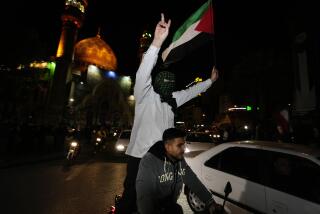Tibetan rioters are arrested, China says
Protesters in Chinese-controlled Tibet were arrested during a riot that erupted after two Buddhist monks were taken into police custody, according to the government’s news agency.
The monks were arrested after a dispute with a shopkeeper, and the subsequent unrest triggered a crackdown, according to the New China News Agency.
The incident occurred in mid-November but was only recently reported in China. The news agency gave no reason for the delay but stressed that “the local social order is stable,” citing statements by local government officials.
Activists say the incident signals an upsurge in protests by the Tibetan majority against the Chinese military’s presence in the Himalayan region.
“It doesn’t take much to spark things right now,” said Brad Adams, the Asia director for Human Rights Watch. “There’s a sense that the Chinese are being heavy-handed on a whole range of issues.”
Adams said it was unclear whether there was an increase in civil disobedience in Tibet or whether efforts to get news of such events to the outside world were more successful. “Even the people who know the most about Tibet aren’t sure,” he said.
Tibetans in exile with ties to the Dalai Lama say China is trying to keep Tibet under tight control in the months leading up to the 2008 Summer Olympics in Beijing.
“If they want to improve their image for the Olympics, they can allow free media access,” said Tsering Tashi, a London-based representative of the Dalai Lama at the Office of Tibet, a group that considers itself the government in exile.
A group called Friends of Tibet said the Chinese had recently restricted travel among Tibetans in response to the protests.
“The Chinese government is restraining travel because they fear Tibetans will spread the message of these protests to different places,” said Tenzin Tsundue, a Tibetan writer and member of Friends of Tibet who lives in India.
Tibetans have demanded more human rights as well as the return of the Dalai Lama, their spiritual leader, who fled into exile 48 years ago after a failed uprising against Chinese rule.
Tibet had de facto independence from the fall of the Qing dynasty in 1911 until the arrival of Chinese communist troops in 1951.
A Tibetan exile in India with family near the remote village of Paingar -- pronounced Palkar by Tibetans -- said that the two monks, both about 16, quarreled with the Chinese shopkeeper Nov. 19 and were beaten by the merchant. They were later arrested.
Neither the exile nor the news agency described the nature of the quarrel, which seemed to suggest tensions between ethnic Tibetans and ethnic Chinese.
The exile, who is a member of Friends of Tibet, said that more than 1,000 people showed up at police headquarters the next day and demanded the monks’ release.
Troops dispatched from Lhasa, 190 miles away, used force to disband the protesters, said the exile, who asked that his name not be used.
According to the New China News Agency, 200 people, including some monks, “destroyed shops and government facilities.”
The news agency said five people were arrested for “fanning the riot.”
Crowds were “persuaded” to return home as authorities sought a third monk for questioning, the news agency said.
Activists said the riots followed other incidents deemed politically sensitive by the Chinese government that had received attention in the Western media.
In February, more than 30 Tibetans were sent to a labor camp after their attempt to flee their homeland across the Himalayas failed. Chinese border guards fired on and killed several members of the unarmed group, according to a survivor.
In August, a nomad named Runggye Adak walked onstage at a horse-racing festival in a Tibetan area of Sichuan province and, as dumbfounded Chinese dignitaries looked on, led the Tibetan crowd in chants calling for the return of the Dalai Lama.
He was arrested after a series of riots and sentenced to eight years in prison, according to Chinese news services.
The protests also have spread outside Tibet. In October, two dozen Tibetan activists living in exile in India broke through the gates of the Chinese Embassy and painted “Free Tibet” on the building walls before being arrested.
Activists say Tibetans also have turned to an unusual strategy: In October, when the Dalai Lama was honored by Congress in Washington, Tibetans lighted firecrackers and burned incense in celebration as monks whitewashed the walls of several monasteries in honor of the Nobel Peace Prize winner.
“People are performing simple cultural gestures without making political statements,” Tsundue said. “The Chinese have responded by trying to stop all fires, even garbage-burning. It’s paranoia.”
Tashi said the Chinese acknowledged the Paingar riots only because of fears the outside world would learn the news anyway.
“Protests are always suppressed, but the word gets out from tourists or others who escape Tibet,” he said. “The outside world comes to know. Then the Chinese are forced to make a comment.”
More to Read
Start your day right
Sign up for Essential California for news, features and recommendations from the L.A. Times and beyond in your inbox six days a week.
You may occasionally receive promotional content from the Los Angeles Times.







